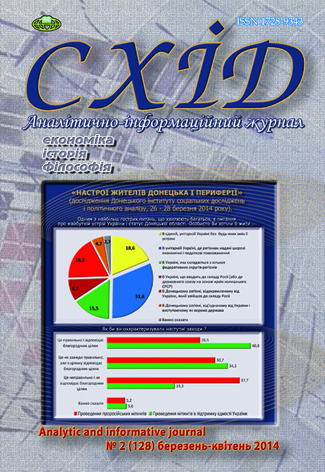Heidegger and Adorno: prolegomena to reconstruction of a dialogue, which never appeared
DOI:
https://doi.org/10.21847/1728-9343.2014.2(128).23399Keywords:
ontico-ontological difference, negative dialectics, being, ideology, discourse, critiqueAbstract
Discourse of Heidegger studies in contemporary Ukraine proves insufficient attention to the world legacy in understanding and interpreting complex thinking of the great German philosopher. In order not to yield the temptations of direct reading, we are advancing the imperative of precise mediation of historical research of Heidegger's philosophy by methods and instruments, which would conform with the actual context of philosophical process worldwide. This article aims to accomplish logical reconstruction of the interspace between discourses of Martin Heidegger and Theodore Adorno. This interspace of the potential dialogue between the two philosophers can be seen not as a gap but rather a joint of one and the same thought being developed in two opposite directions. Adornian approach to understanding Heidegger's thinking is viewed as a methodological model for the contemporary needs of the historiographical hermeneutics of Heidegger's philosophy. In the terms of ideological criticism Heideggerian conceptuality assume the form of a jargon, which stylistically derives from archaistic tendencies of the late Romanticism. Unlike P. Bourdieu, Adorno does not aim to reveal the social background of this proximity between existential philosophy and cultural conservatism of the Weimar epoch, but rather he persists in deconstructing the key concepts of Heidegger's philosophy, so that he would reveal its neutralizing and metaphysical effects. In Adorno's transcription of the difference between onticity and ontology, the latter appears as a form of reification, and consequently as a philosophical form of ideology preoccupied with the conservative claims to preserve the existing order. The conservative move of Heidegger's logic consists in subjugation of Dasein to being, where being is conceptually charged as a secularized deity. Heidegger's possible response to Adorno's invectives should certainly avoid Heideggerian language. It is necessary to obtain an outer position to both discourses, if we want to elicit novel forms of thought.
Downloads
References
Адорно Т. Жаргон подлинности / Теодор В. Адорно ; [пер. с нем. Е. В. Борисов]. - М. : "Канон+" РООИ "Реабилитация", 2011. - 191 с.
Адорно Т. Негативная диалектика / Теодор В. Адорно; [пер. с нем. Е. Л. Петренко]. - М. : Научный мир, 2003. - 374 с.
Кречетова М. Вопрос о подлинности: Т. Адорно versus М. Хайдеггер / М. Кречетова // Вестник Томского государственного университета. Философия. Социология. Политология. - 2011. - № 2 (14). - С. 122-129.
Buck-Morss S. The Origin of Negative Dialectics / Susan Buck-Morss. - New York : The Free Press, 1977. - 350 p.
Garlitz D. Frankfurt School contra Heidegger: Adorno's Cultural Critique of the Ideology of German Existentialism // Garlitz D. The Jargon of Authenticity [Електронний ресурс] / Dustin Garlitz. - Режим доступу : http://www.philosophyofculture.org/Adorno_contra_Heidegger_The_Jargon_of_Authenticity_Garlitz _2010_5.pdf.
Jay M. Taking on the Stigma of Inauthenticity: Adorno's Critique of Genuineness / Martin Jay // Language without Soil: Adorno and the Late Philosophical Modernity / [Gerhard Richter (ed)]. - New York : Fordham University Press, 2010. - Pр. 17-29.
Macdonald I. Adorno and Heidegger: philosophical questions / Iain Macdonald ; [Krzysztof Ziarec (ed)]. - Stanford : Stanford University Press, 2008. - 214 p.
Rayman J. W. A Heideggerian Defence of Phenomenology against Adorno's Negative Dialectical Critique / Joshua William Rayman // Does the world exist? Plurisignificant ciphering of reality / [A.-T. Tymieniecka (ed)]. - Dordrecht : Kluwer Academic Publishers, 2004. - Pр. 637-348.
REFERENCES
Adorno T. (2011), The Jargon of Authenticity, Canon+, Moscow, 191 p. (rus).
Adorno T (2003), Negative Dialectics, Nauchnyy Mir, Moscow, 374 p. (rus).
Krechetova M. (2011), The Question of authenticity: Th. Adorno versus M. Heidegger, Vestnik of Tomsk State University. Philosophy. Sociology. Politology, 2(14), pp. 122-129 (rus).
Buck-Morss S. (1977), The Origin of Negative Dialectics, The Free Press, New York, 350 p. (engl).
Garlitz D. (2010), Frankfurt School contra Heidegger: Adorno’s Cultural Critique of the Ideology of German Existentialism in The Jargon of Authenticity, available at: http://www.philosophyofculture.org/Adorno_contra_Heidegger_The_Jargon_of_Authenticity_ Garlitz_2010_5.pdf (engl).
Jay M. (2010), Taking on the Stigma of Inauthenticity: Adorno’s Critique of Genuineness, In: Language without Soil: Adorno and the Late Philosophical Modernity, Fordham University Press, New York, pp. 17-29 (engl).
Macdonald I. (2008), Adorno and Heidegger: philosophical questions, Stanford University Press, Stanford, 214 p. (engl).
Rayman J. W. (2004), A Heideggerian Defence of Phenomenology against Adorno’s Negative Dialectical Critique, In: Does the world exist? Plurisignificant ciphering of reality, Kluwer Academic Publishers, Dordrecht, pp. 637-348 (engl).
Downloads
Published
How to Cite
Issue
Section
License
Copyright (c) 2014 Andriy Karpenko

This work is licensed under a Creative Commons Attribution-NonCommercial-NoDerivatives 4.0 International License.
1. Authors bear responsibility for the accuracy of facts, quotations, numbers and names used.
2. Manuscripts are not sent back.
3. The publisher does not always agree with the authors' opinion.
4. The authors reserve the right to authorship of the work and pass the first publication right of this work to the journal under the terms of a Creative Commons Attribution-NonCommercial-NoDerivatives 4.0 International License. This license allows others to distribute (copy) the published work for non-commercial purposes, provided there is mandatory attribution to its authors and a link to the first publication in our journal.
5. The authors have the right to conclude separate supplement agreements that relate to non-exclusive work distribution in the form in which it has been published by the journal (for example, to upload the work to the online storage of the journal or publish it as part of a monograph), provided that the reference to the first publication of the work in this journal is included.

